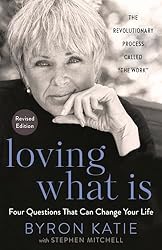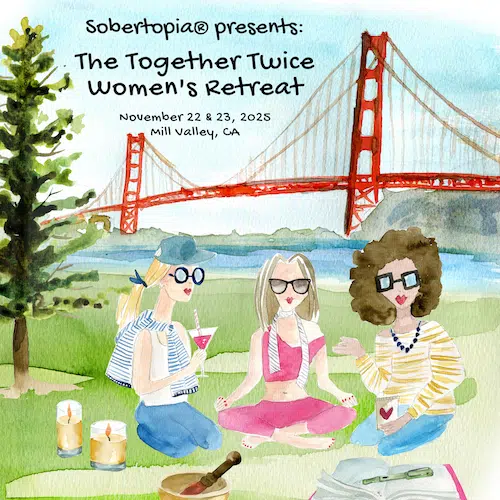About six months ago I went on a lunch date. (Spoiler: The date didn’t lead to anything romantic but he did become a mentor in the magazine industry which I’m thankful for.) During the meal he was describing trouble he’d been having with a pinched nerve in his shoulder – nothing too serious but bothersome and requiring physical therapy. After telling his story he looked at me and said, “What about you? What do you have going on?” I thought for a second, and was genuinely surprised to be able to say, “Honestly, nothing. I’m feeling really good!”
I feel physically, mentally and emotionally good and I’m focused every day on feeling even more so. This wasn’t at all the case when I was tired and anxious from drinking at night. Since the day I stopped drinking my first thought each morning has been “I’m so grateful I get to wake up feeling so good.” And the truth is, over time, it continues to get better and better. I realized this lunch date was the first time I’d expressed that out loud or let myself really think about it.
Feeling physically good has given me the strength and confidence to work towards massive goals I wasn’t able to achieve when I was fuzzy-headed and tired most mornings from consuming alcohol the night before, and the clarity to work through my emotional past as well. This feeling has been my beacon, my WHY, and my biggest win and, as I discovered, I was holding onto it with a death grip with both hands.
A pause for perspective: None of this has been life-threatening, and for that I am grateful. The message here is it’s not the illness itself that matters, it’s the feeling. (True for most things actually.)
Not feeling good after working hard to overcome addiction, gray-area drinking that led to hangovers, or even other illness can be massively triggering. Let’s start with the premise that whatever you’re going through, big or small, if you’re experiencing that feeling, then that’s where you are.
This feeling has been my beacon, my WHY, and my biggest win and, as I discovered, I was holding onto it with a death grip with both hands. Until I lost it.
In my case, my brain has taken every chance it can to confuse the exhaustion, fuzzy-headedness and nausea of being sick with that of being hungover, bringing me back to a place I don’t want to be. I instinctively blame myself for not getting enough done, reliving haunted echos of former shame spirals when all I wanted to do was rest even with so much on my plate. Missing beautiful blue-skied days is anxiety provoking when I’ve missed, or struggled through, too many in the past, numb to the joy of my ONE favorite season. Worrying about test results floods me with guilt about how my body was not nearly as healthy when I was drinking alcohol, and the deep-down knowledge that this was my own fault and might still catch up with me.
Here are a few things that helped me get through this (and other situations that have challenged my recovery:
ADVERTISEMENT
1. Remember you are not your past self.
In triggering moments, (meetings with accountants, illness, tough job meetings) the first thing I remind myself is “I am not my past self.” I am healthy, organized, responsible, successful, happy, peaceful and calm. Nothing, including illness can take away the strides you’ve made on your journey or bring back the past (even when your brain is tricking you). We get to start anew in every moment and this is the time to remember how far you’ve come, who you are now, and where you’re headed. Proceed from a place of new knowledge.
2. Repeat gentle affirmations
“I am healthy”
“I am strong”
3. Grant yourself physical relief and self care:
• Hot showers (or warm, or cold depending on the day and what feels good). A few drops of lavender oil on the end of the tub to incorporate into the steam. A gentle body scrub if that feels good to you.
• A really comfortable pillow (this has been one of the cornerstones of my recovery – more on this another time)
• Comforting foods: soups, pasta, rice, etc. I’ve found sushi take-out to be comforting on occasion.
• Tea with mint and honey
• Fresh sheets on the bed
• Gentle stretching or yoga (I like happy baby which I can do from my bed and eases back tension and puppy pose, also on the edge of the bed – apparently I only do yoga on my bed.)
• Meditation. In the summer I like to sit outside in the mornings and meditate for 15 minutes.
• Massage, if you’re lucky and have a talented partner (or professional massage if you’re not contagious – this is going to be my next move once I test negative). I also love my fascia blaster for self massage (I’ll add a link below)
• A walk if you are able
• Sleep, and more sleep. My sleep schedule shifts about 3 hours later when I’m sick. If you can, go with what your body wants.
4. Go outside
5. Allow yourself a break
6. Connect, communicate, and ask for help.
Illness can deliver a triple whammy of isolating you, making it difficult to accomplish tasks on your plate and making you vulnerable to needing help from others.
Connect – Some alone time might feel good, but it’s important to keep human connection going if you’re getting in your head. Reach out to friends to chat as much as you are able or just text people what’s going on and ask them to check on you. If you have a sponsor or a sobriety buddy, reach out to them and come up with a game plan.
Communicate – Accept that you will not be able to do what you normally do. Communicate early and often so people know what to expect so you don’t start feeling shame about letting yourself, or other people down. If you like put new, gentle and realistic, dates for your tasks on you calendar so you know they will still get done in the future.
Ask for help – Start calling in favors and asking for help without shame. Studies show that individuals get more satisfaction from helping someone else than they do from receiving the help.** This is a win-win. Asking for help can look like many things – requesting a rides for your kids, soliciting advice from people who’ve been in the same situation as you, ordering food, or asking a friend to pick up tea or medications at the pharmacy. (Some info about recovery-appropriate medications in the articles cited below)
7. Get off social media and dating apps
I may be speaking from experience here – too much of this will make you feel worse about yourself, invade your head space and ultimately make you feel more triggered and lonely. Moderate or avoid. Spend your time watching a show, journaling, soaking in a bath, reading, or sleeping.
8. Double down on gratitude
This can be hard to do when you’re not feeling great, but just like with affirmations start with the most basic things that feel true to you. When I don’t feel good I often start with “I’m grateful that I’m not also hungover.” (Let’s be honest there was a time I would have still had a martini or a glass of wine at night even if I was sick – you know, to kill the germs…)
My daily gratitude practice includes my comfy pillow, soft sheets, my lovely bed, my orchids, the fact that my dog chills with me all day while I’m sick, food delivery, my kids are old enough to take care of themselves a little bit.
When I finally gave myself permission to rest, I Googled to see if other people have also been triggered by illness after recovery. The answer is Yes. I’m including links below to other articles on this subject that I found in my research.
Have you ever experienced this kind of emotional trigger from sickness? What was difficult for you? What helped you work through it?
As an aside, the mammogram was clear, thank God. Afterwards, I sat in the little dressing room and said a prayer of thanks for both the results and for the radiology tech who appropriately recommended a book she loved about letting go of limiting beliefs – I’m including a link to that book below.)
Wishing you all a healthy and beautiful summer and the grace to know when it’s ok to let the kids be late to school so you can remove a splinter from your foot.
xoxo, Nicole
More from this article
Contains affiliate links
Additional articles / resources:
How to stay sober while being sick, Pinetree Recovery:
https://www.pinetreerecovery.com/addiction-recovery-relapse-prevention/how-to-stay-sober-while-being-sick/
Your Sick-While-Sober Survival Guide, Serenity Lane
https://serenitylane.org/blog/your-sick-when-sober-survival-guide/
Dealing with Illness while in Recovery from Addiction, Cornerstone of Recovery
https://www.cornerstoneofrecovery.com/season-of-sickness-dealing-with-illness-while-in-recovery-from-addiction/
Six ways to cope with feeling sad when you’re sick, Emily Boynton for Right As Rain
https://rightasrain.uwmedicine.org/mind/mental-health/sad-when-sick
Common Relapse Triggers and How to Avoid Them, Gateway Foundation
https://www.gatewayfoundation.org/addiction-blog/triggers-in-addiction-recovery/






